Changing the Image of the Country through Culture and the Arts
―Could you talk about the history of Cambodian Living Arts?
Prim: I have to explain that the war was the background of its foundation. Khmer Rouge caused the Cambodian Civil War, and they had a philosophy about national isolation and the revival of a simple, rural lifestyle. They were against culture, religion, and the influence of foreign countries, and massacred a number of artists to erase the cultural roots of the country. As a result, we were about to lose our own culture.
When the country started recovering, the activity of Cambodian Living Arts became important, because our traditional culture had been passed down orally. For example, people listened to music and inherited it by playing it. They don't use scores or notation. Dance is the same. There were both old and young people at that time, but the generations between them were lost in the war. So they started an activity in 1998: Masters of traditional arts would teach young people.
The founder and board members did not want to let the activity end up in a temporary project, so in 2001, they developed a vision for 2020. In this vision, they described an image of the future, when culture and the arts would symbolize Cambodia. Many people throughout the world only associate Cambodia with the war, and I remember I was very interested in the task of changing that image.
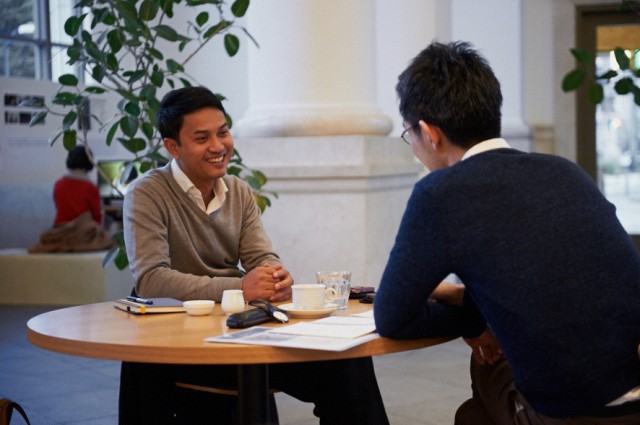
Photo: Jouji Suzuki
―Changing the image of a country through culture and the arts must be a big challenge.
Prim: Yes. However, while our activity was very important 20 years ago, we need to look into how new generations can fulfill this vision. It is very important that young people understand their own culture, but preservation and inheritance are not enough; culture is alive. If you frame a culture, it does not develop anymore, and society does not develop anymore either. I think we should offer opportunities for creation in the contemporary context, while staying rooted in tradition.
Currently, while trying to offer opportunities for creation to young people, I have also been exploring an economic model for culture. I don't want them to think that becoming an artist means living an impoverished life. I want to create projects for people to find values and have dignity while being an artist.
Next Generation Leadership for the Development of Culture and the Arts
―Could you talk about the activities of Cambodian Living Arts?
Prim: Cambodian Living Arts places importance on our leadership program, the Living Arts Fellows Program.
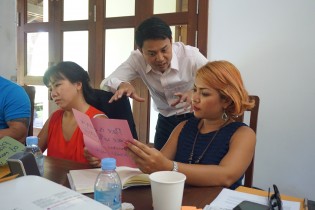
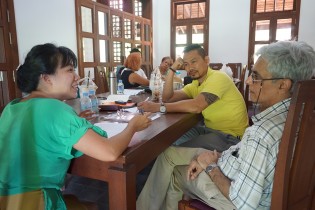
The Living Arts Fellows Program ©Hermione Brooks
Prim: When it comes to the sustainability of the cultural sector, artists cannot continue creating alone; they need arts managers. The country has been evolving, and it has formed a foundation. Therefore, I thought we would need to develop the leadership of the next generation—to take over the foundation.
When I was preparing for a festival called "Season of Cambodia" in New York, someone asked me, "Why do you organize the project alone?" That made me think. I said, "I don't want to do it alone, but there isn't a new generation for projects that require leadership." I thought hard about this after that, and came to realize that if we invest in young generations now, they would promote similar projects some years later. So we started to plant seeds of leadership for the future of the cultural sector in Cambodia.
―Specifically, what kind of program is it?
Prim: There is no arts management curriculum in Cambodia, and many of the young leaders are managing their organizations. Therefore, I thought that a platform for exchanging ideas would be more important than a class or training. Therefore, this program focuses on networking between participants and other countries.
For instance, we invite senior leaders from India, Malaysia, and other countries in Asia to be mentors at our Fellows workshops. It is important not to look at culture domestically. Rather, it should be viewed as an area that includes neighboring countries, and we should have a global point of view about the overall situation. I think that is the only way to promote cultural development.
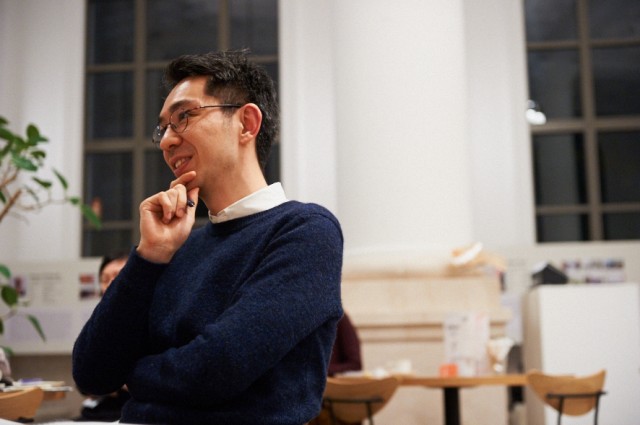
Photo: Jouji Suzuki
―The idea of an area that includes neighboring countries is very interesting.
Prim: I expect that this leadership program will develop into a regional program, which covers these neighboring countries. It will function as a hub for leaders in the countries surrounding the Mekong River. I also expect that they will learn both artistic skills and will contemplate about the kinds of impacts culture and the arts can have on society.
I think you know that Salzburg Global Seminar has been organizing "Young Cultural Innovators," a program to connect 500 young innovators across the world, who will be cultural leaders in the future. They plan to create ten hubs across the world, dispatch 50 young innovators to these hubs, and share ideas about future leadership.
I was invited to the seminar, and I proposed that Cambodia should be one of the hubs. I don't want to make Cambodia a hub for Cambodian people—but for the Mekong basin, including Thailand, Vietnam, Myanmar, Laos, and Cambodia. We have similar roots and are in similar situations. I think the leadership program of Cambodian Living Arts can spread from Cambodia to the surrounding regions—and then globally—by cooperating with Salzburg Global Seminar.
What Is Required in Asia?
―In the context of your interest in the neighboring countries (and Asia in a broader sense), could you talk about Asia-Pacific Network for Cultural Education and Research (ANCER) that was held in Phnom Penh in January 2016?
Prim: ANCER is a network project for sharing ideas about arts management and cultural policy in the Asia-Pacific region that was founded in 2012. The third international conference was held in 2016, which Cambodian Living Arts had hosted and curated. It was impressive that not only young but also senior arts managers and researchers such as Margaret Shiu from Taiwan took part in ANCER in Phnom Penh. Staff members of international cultural organizations such as the Jakarta offices of The Japan Foundation and British Council as well as Asian Cultural Council also took part in it.
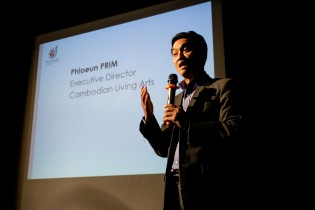
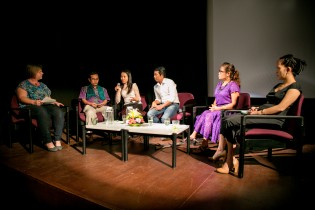
Asia-Pacific Network for Cultural Education and Research (ANCER) (c) Dara Rin
―What kinds of topics did you discuss?
Prim: First, Margaret Shiu proposed that we should look more deeply into the Asian regions by asking, "We Asians are always looking at Europe and North America, aiming to study in New York or Paris and present shows in London. But what about Kuala Lumpur, Bangkok, or Jakarta?"
I agree with her. Exchanges in East Asia or in Southeast Asia have become active, but what about exchanges between East Asia and Southeast Asia? So we discussed the possibility of an exchange between East Asia and Southeast Asia: issues that it would involve, and what we need to promote the exchange.
As a result, an idea of a mobility grant for Asian regions was proposed. It is a grant that anyone in Asia can apply for. We don't need a huge subsidy. $2,000 or 3,000 USD is enough to promote a cooperative exchange throughout Asia.
Our lives are dependent on the internet, but we can create wonderful, meaningful, and long-term relationships by physically meeting and talking. For example, I met Stephen Armstrong from Melbourne at TPAM 2016 (Performing Arts Meeting in Yokohama) and deepened our discussion. I will invite him to Cambodia next month. Meeting in person is very valuable. The results of TPAM will be visible for the next ten years.







